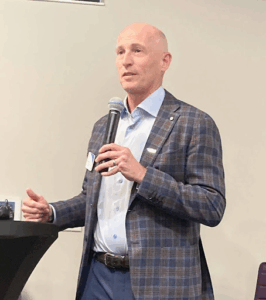5-year plan unveiled to address homelessness in Polk County


Scott Jean, CEO and president of EMC Insurance Cos., concluded an event at which the Blueprint to Address Homelessness in Polk County was unveiled by talking about differences between oak trees and redwoods.
Oak trees can grow to be 200 feet tall and live up to 200 years, Jean told the nearly 100 people gathered at C3 Center in Des Moines Tuesday afternoon for the event. Oak trees “are great, wonderful trees. But the only thing about oak trees is that they just support themselves.”
An oak tree’s root system is as deep as the tree is high and it’s only that one root system that supports the rest of the tree, Jean said. “That’s the way a lot of businesses, nonprofits and communities operate. We operate in silos. We work together very little.”
Imagine, Jean said, what could be accomplished if communities, businesses and nonprofits were more like redwood trees that can grow to be 3,000 feet tall and live 1,000 years or more. Much of a redwood tree’s roots are near the surface and entangled with the roots of other redwoods, Jean said.
The redwoods “get their strength from each other,” he said. “Their root systems grow together and create an environment where the trees support one another.”
The Blueprint to Address Homelessness is a roadmap to eliminating homelessness in Des Moines and Polk County, Jean said. “This plan is a phenomenal output of a lot of work … but the work is just beginning. It’s time for the community … to rally behind this plan and to create an elaborate, above-ground root system where everyone is dependent upon each other, and then we have success together for our community.”
The five-year strategic plan is the culmination of more than six months of work by more than 250 people who met to discuss ways to reduce homelessness in Polk County. The plan includes strategies that have been successful in other areas. It also pinpoints the groups responsible for implementing key strategies and deadlines for implementation.
“Growing housing challenges have unfortunately led to an increase in homelessness for individuals and families across our region,” Kristi Knous, president of the Greater Des Moines Community Foundation, said during a video shown at Tuesday’s event. “With quality housing closely tied to health and well-being, our community must do better to find solutions in today’s ever-changing landscape.”
In fiscal year 2024, an estimated 3,194 households, or 4,017 people, experienced homelessness sometime during the period and were served by the homelessness response team, according to the plan. More than 300 of the households included families with children; about 2,870 were single-adult households.
To help reduce the number of homeless people in Polk County in the coming years, the strategic plan proposes:
- Reducing inflow into homelessness systems. To do that requires having emergency assistance funds available to help pay overdue rent and utility bills. It also means providing mediation between tenants and property owners, help with household budgeting and connections to community services and benefits.
- Improving crisis response capacity. Proposed strategies include securing 30 additional emergency housing units for families and 50 units for single adults.
- Ending unsheltered homelessness. Proposed strategies include establishing a coordinated outreach plan and more quickly connecting unsheltered people with resources.
- Accelerating exits from homelessness to stable housing. One strategy includes securing rental units in the private market to house people in need of a home.
- Strengthening connections to adjacent systems. One proposed strategy includes providing training for all involved with the homelessness system about programs and services provided by agencies and groups that work with people in need of housing.
- Improving system management. Designers of the strategic plan want to ensure that all relevant data about people who are homeless in Polk County and the services that are provided to them are entered into a management system. The system would allow service providers to identify frequent users of homelessness assistance and target them for more intensive housing support services.
- Expanding affordable housing options. A proposed strategy is securing housing choice vouchers for people exiting homelessness.
Implementing the strategies will initially cost over $1.5 million, according to the plan. The Community Foundation of Greater Des Moines is providing an initial investment of $100,000 to implement the plan.
Jean said he has talked to the board of EMC’s foundation about waiting to launch any new capital campaigns. “If we can address homelessness first before we start building another park … it’s going to improve our community a lot,” he said in an interview after the event. “I’ve suggested that we be a little more strategic in how we’re spending our dollars.”
Jean said he is hopeful that the Des Moines-area business community “can lead with empathy. If you have employees who are afraid to come to the office because they perceive it as unsafe, that’s not good for our community.”
Some in the business community have been waiting to see how leaders planned to address the homelessness issue, Jean said. “The Blueprint answers a lot of questions people have had. I think we’re going to see a lot of support for it,” he said.
To read the Blueprint to Address Homelessness in Polk County, click here.

Kathy A. Bolten
Kathy A. Bolten is a senior staff writer at Business Record. She covers real estate and development, workforce development, education, banking and finance, and housing.









